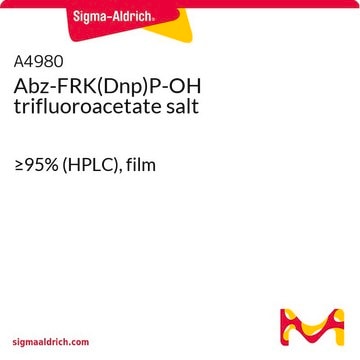A6778
Angiotensin Converting Enzyme from rabbit lung
≥2.0 units/mg protein (modified Warburg-Christian)
Synonym(s):
ACE, Peptidyl-dipeptidase A, Peptidyldipeptide Hydrolase
Sign Into View Organizational & Contract Pricing
All Photos(1)
About This Item
CAS Number:
MDL number:
UNSPSC Code:
12352204
eCl@ss:
42010109
NACRES:
NA.32
Recommended Products
form
lyophilized powder
Quality Level
specific activity
≥2.0 units/mg protein (modified Warburg-Christian)
shipped in
dry ice
storage temp.
−20°C
Looking for similar products? Visit Product Comparison Guide
General description
The angiotensin-converting enzyme (ACE) is a dipeptidyl-carboxypeptidase which exists in somatic and testicular isoforms with zinc binding motif HEXXH in their active site. ACE regulates blood pressure through renin-angiotensin system. ACE elevates blood pressure by converting angiotensin I to a key vasoconstrictor angiotensin II and inhibiting a potent vasodilator bradykinin. Inhibition of ACE is a targeted therapeutic strategy for high blood pressure. Several ACE synthetic inhibitory peptides available for clinical use include captopril, enalapril and lisinopril. Currently, developing inhibitory peptides from natural food sources, or phenolic compounds from plant sources to inhibit ACE is underway. ACE plays a critical role in fertilization by releasing the proteins anchored to glycosylphosphatidylinositol (GPI) in sperm membrane.
Application
Angiotensin converting enzyme from rabbit lung has been used:
- for measuring inhibitory effect of egg white protein hydrolysates on ACE activity by high performance liquid chromatography (HPLC)
- to measure the ACE inhibition by litchi pericarp and cooked chicken breast using hippuryl-L-histidyl-L-leucine (HHL) as substrate by reverse phase-HPLC (RP-HPLC)3 and HPLC respectively
- in releasing GPI anchored protein in vitro in few cell lines like HeLa, HEK293 and in vivo in mice sperm.
Biochem/physiol Actions
Removes C-terminal dipeptides from susceptible substrates, e.g., angiotensin I and bradykinin.
Quality
May contain traces of sodium chloride.
Unit Definition
One unit will produce 1.0 μmole of hippuric acid from Hippuryl-His-Leu per min in 50 mM HEPES and 300 mM NaCl at pH 8.3 at 37 °C.
inhibitor
Product No.
Description
Pricing
substrate
Signal Word
Danger
Hazard Statements
Precautionary Statements
Hazard Classifications
Resp. Sens. 1
Storage Class Code
11 - Combustible Solids
WGK
WGK 3
Flash Point(F)
Not applicable
Flash Point(C)
Not applicable
Personal Protective Equipment
dust mask type N95 (US), Eyeshields, Gloves
Certificates of Analysis (COA)
Search for Certificates of Analysis (COA) by entering the products Lot/Batch Number. Lot and Batch Numbers can be found on a product’s label following the words ‘Lot’ or ‘Batch’.
Already Own This Product?
Find documentation for the products that you have recently purchased in the Document Library.
Customers Also Viewed
Yating Lu et al.
Journal of Zhejiang University. Science. B, 22(7), 575-589 (2021-07-17)
The aim of this work is to discover the inhibitory mechanism of tea peptides and to analyse the affinities between the peptides and the angiotensin-converting enzyme (ACE) as well as the stability of the complexes using in vitro and in
Angiotensin-converting enzyme inhibitory activity of milk protein hydrolysates: Effect of substrate, enzyme and time of hydrolysis
Otte J, et al.
International dairy journal, 17(5), 488-503 (2007)
Mina Ojaghi et al.
Molecular reproduction and development, 84(5), 376-388 (2017-03-01)
We hypothesized that the testis-specific isoform of angiotensin-converting enzyme (tACE) is released during bovine sperm capacitation, and its peptidase activity is required for capacitation. Specific objectives of this study were to (i) develop an anti-tACE antibody; (ii) characterize expression of
M Hernández-Presa et al.
Circulation, 95(6), 1532-1541 (1997-03-18)
The migration of monocytes into the vessel wall is a critical event leading to the development of atherosclerosis. Monocyte chemoattractant protein-1 (MCP-1) is the main chemotactic factor involved in this phenomenon, and nuclear factor-kappa B (NF-kappa B) is one of
Angiotensin converting enzyme (ACE) inhibitory peptides derived from the simulated in vitro gastrointestinal digestion of cooked chicken breast
Sangsawad P, et al.
Journal of functional foods, 29, 77-83 (2017)
Our team of scientists has experience in all areas of research including Life Science, Material Science, Chemical Synthesis, Chromatography, Analytical and many others.
Contact Technical Service






![N-[3-(2-Furyl)acryloyl]-Phe-Gly-Gly](/deepweb/assets/sigmaaldrich/product/structures/225/349/530bc714-b1a8-4fdb-8082-a39329ee730a/640/530bc714-b1a8-4fdb-8082-a39329ee730a.png)







